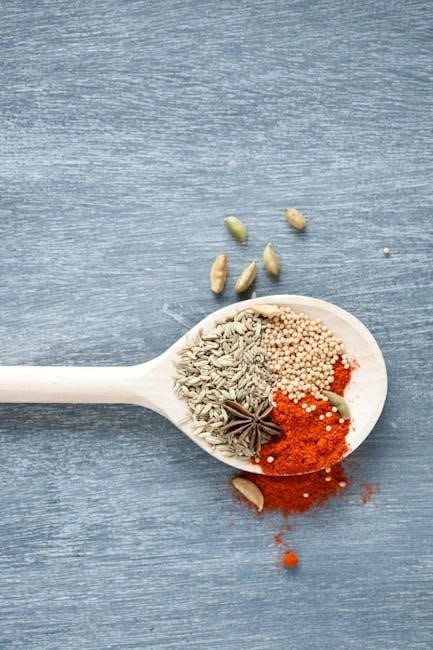Understanding PCOS and Its Connection to Diet

PCOS, or Polycystic Ovary Syndrome, is a hormonal disorder affecting women, often linked to insulin resistance and weight challenges․ Diet plays a crucial role in managing symptoms, balancing hormones, and improving insulin sensitivity․ By focusing on whole, nutrient-dense foods, healthy fats, and mindful carbohydrate choices, individuals can better regulate their condition and enhance overall well-being․
1․1 What is PCOS?
Polycystic Ovary Syndrome (PCOS) is a hormonal disorder affecting 5-10% of women of reproductive age․ It is characterized by high androgen levels, irregular menstrual cycles, and the presence of cysts on the ovaries․ Symptoms include weight gain, acne, excess hair growth, and infertility․ PCOS is often linked to insulin resistance, which can lead to metabolic complications; While the exact cause is unknown, genetics and environmental factors are believed to play a role․ Managing PCOS requires a holistic approach, with diet and lifestyle changes being critical components․ Early diagnosis and personalized strategies can significantly improve symptoms and quality of life for those affected․
1․2 The Role of Nutrition in Managing PCOS

Nutrition plays a vital role in managing PCOS, as dietary choices can significantly impact hormonal balance, insulin sensitivity, and overall symptoms․ A well-structured diet helps stabilize blood sugar, reduce inflammation, and promote weight management, which are critical for those with PCOS․ Emphasizing whole, unprocessed foods like vegetables, lean proteins, and healthy fats can improve insulin function and hormone regulation․ Additionally, avoiding sugary and high-carbohydrate foods helps prevent insulin spikes, which are common in PCOS․ Incorporating anti-inflammatory foods and staying hydrated further supports symptom relief․ A tailored nutritional approach not only alleviates PCOS symptoms but also contributes to long-term health and well-being․

Key Dietary Principles for PCOS
Focus on balancing macronutrients, choosing healthy fats, and carefully selecting carbohydrates․ Prioritize whole, anti-inflammatory foods, limit sugary staples, and stay hydrated to manage symptoms effectively․
2․1 Balancing Macronutrients for Hormonal Stability
Balancing macronutrients is essential for managing PCOS symptoms, particularly hormonal stability․ A diet rich in protein helps regulate blood sugar and insulin levels, while healthy fats, such as avocado and olive oil, support hormone production․ Carbohydrates should be chosen wisely, focusing on low-glycemic options like whole grains, vegetables, and legumes to avoid blood sugar spikes․ This balance not only aids in weight management but also improves insulin sensitivity, reducing the risk of related conditions like type 2 diabetes․ Incorporating these macronutrients in the right proportions can help stabilize hormones, alleviate symptoms, and promote overall metabolic health for individuals with PCOS․
2․2 Incorporating Anti-Inflammatory and Superfoods
Incorporating anti-inflammatory and superfoods into your PCOS diet is crucial for reducing inflammation and promoting hormonal balance․ Foods like leafy greens, berries, and fatty fish (rich in omega-3s) help combat inflammation, a common issue in PCOS․ Superfoods such as turmeric, ginger, and cinnamon have natural anti-inflammatory properties, while antioxidants like vitamins C and E support overall health․ Including these foods can improve insulin sensitivity, regulate blood sugar, and enhance ovarian function․ By focusing on whole, nutrient-dense options, individuals with PCOS can create a diet that not only manages symptoms but also fosters long-term well-being․ These foods are often highlighted in PCOS cookbooks as essential components of a balanced and therapeutic meal plan․
Meal Planning Strategies for PCOS
Effective meal planning for PCOS involves balancing carbs, proteins, and fats, while emphasizing whole, anti-inflammatory foods․ Structured plans, like 7-day or 21-day schedules, help maintain consistency, regulate blood sugar, and improve insulin sensitivity, making it easier to manage symptoms and achieve long-term health goals․
3․1 Creating a 7-Day PCOS Meal Plan
Creating a 7-day PCOS meal plan involves structuring balanced meals to regulate blood sugar, improve insulin sensitivity, and manage symptoms․ Start by planning breakfast, lunch, dinner, and snacks for each day, focusing on whole, nutrient-dense foods․ Incorporate protein-rich options like lean meats, fish, and legumes, paired with healthy fats and low-glycemic carbohydrates․ Avoid sugary and processed foods, opting instead for whole grains, vegetables, and anti-inflammatory ingredients․ Include a variety of colorful fruits and vegetables to ensure a broad range of vitamins and minerals․ A sample plan might feature recipes like avocado toast for breakfast, grilled chicken salads for lunch, and baked salmon with quinoa for dinner․ Don’t forget to add snacks like nuts or yogurt to keep energy levels stable throughout the day․ A well-organized grocery list based on this plan will help maintain consistency and make meal prep easier․ This structured approach supports hormonal balance and overall well-being for individuals with PCOS․
3․2 Sample Recipes for Breakfast, Lunch, and Dinner
Start your day with a PCOS-friendly breakfast like avocado toast topped with poached eggs and a sprinkle of turmeric for anti-inflammatory benefits․ For lunch, try a grilled chicken salad with mixed greens, cherry tomatoes, cucumber, and a light olive oil dressing․ Dinner could feature baked salmon with roasted vegetables like broccoli, Brussels sprouts, and sweet potatoes, seasoned with herbs like garlic and rosemary․ These recipes focus on whole, nutrient-dense foods, avoiding processed ingredients and excessive sugars․ Each meal is designed to stabilize blood sugar, promote hormonal balance, and support overall health․ Incorporate these ideas into your 7-day meal plan for a delicious and balanced approach to managing PCOS․
3․3 Grocery Shopping List for PCOS-Friendly Ingredients
A well-stocked pantry is essential for managing PCOS through diet․ Focus on whole, unprocessed foods like grass-fed meats, wild-caught fish, and free-range eggs․ Include non-starchy vegetables such as spinach, broccoli, and bell peppers․ Opt for low-sugar fruits like berries and citrus․ Whole grains like quinoa and cauliflower rice are great alternatives․ Healthy fats, including avocados, olive oil, and coconut oil, are key․ Don’t forget anti-inflammatory spices like turmeric, cinnamon, and ginger․ For snacks, choose nuts, seeds, and low-carb options like kale chips․ Avoid sugary, processed foods and refined carbohydrates․ This list will help you create balanced, PCOS-friendly meals that support hormonal health and insulin sensitivity․
Delicious and Nutritious Recipes

Discover mouthwatering, PCOS-friendly recipes that blend flavor and nutrition, helping you manage symptoms while enjoying meals․ From hearty breakfasts to satisfying dinners, these dishes promote hormonal balance and wellness․
4․1 Breakfast Recipes to Boost Metabolism
Start your day with nutrient-packed breakfasts designed to kickstart metabolism and stabilize blood sugar․ Recipes like Keto Cinnamon Rolls and Spinach and Feta Omelette offer healthy fats and proteins․ Chia Pudding with Berries provides fiber and antioxidants, while Avocado Toast with Poached Eggs delivers sustained energy․ These dishes are low in carbs, gluten-free, and sugar-free, aligning with PCOS dietary needs․ Incorporate ingredients like almond flour, coconut milk, and fresh herbs for flavorful, balanced meals․ These recipes not only satisfy cravings but also support hormonal balance and weight management․ A PCOS Cookbook PDF often includes a grocery list and step-by-step instructions, making meal prep easy and enjoyable․
4․2 Healthy Snacks to Stabilize Blood Sugar
Snacking wisely is essential for managing blood sugar and energy levels in PCOS․ Opt for low-carb, high-protein, and high-fiber options like raw veggies with hummus, nuts, or seeds․ Almond Butter with Celery Sticks and Cucumber Slices with Greek Yogurt Dip are tasty, balanced choices․ Hard-Boiled Eggs or Cottage Cheese provide sustained energy and protein․ Incorporate antioxidant-rich snacks like Blueberries with Chia Seeds or Dark Chocolate-Dipped Almonds for a sweet treat․ These snacks help regulate insulin levels, prevent sugar spikes, and support overall metabolic health․ A PCOS Cookbook PDF often includes quick, easy recipes for these snacks, ensuring they fit seamlessly into your daily routine․
Advanced Meal Planning and Resources

Explore comprehensive guides and structured meal plans tailored for PCOS management․ Utilize resources like the 21-Day Keto Paleo PCOS Meal Plan and Free PCOS Cookbook PDF for sustainable diet solutions․
5․1 21-Day Keto Paleo PCOS Meal Plan
A 21-Day Keto Paleo PCOS Meal Plan offers a structured approach to managing symptoms through diet․ This plan is designed to be gluten-free, sugar-free, dairy-free, and grain-free, ensuring meals are low in carbs and rich in nutrients․ With a focus on whole foods, healthy fats, and protein, it aims to stabilize blood sugar and enhance insulin sensitivity․ Each day’s menu is carefully crafted to keep net carbs under 20g, making it ideal for women with PCOS who struggle with weight management and hormonal balance․ The plan includes detailed recipes, shopping lists, and tips to simplify meal prep and maintain long-term adherence․ This comprehensive guide helps individuals adopt a sustainable lifestyle tailored to their dietary needs, promoting overall health and well-being without feeling deprived․
5․2 Free PCOS Cookbook PDF Resources
Accessing free PCOS cookbook PDF resources can be a game-changer for managing symptoms․ These resources often include comprehensive meal plans, recipes, and shopping lists tailored to PCOS dietary needs․ Many PDF guides focus on gluten-free, sugar-free, and low-carb options, aligning with the recommended PCOS diet․ They provide practical advice on balancing macronutrients, incorporating anti-inflammatory foods, and preparing nutritious meals․ Some resources also offer a 3-Day or 21-Day meal plan, perfect for those starting their journey․ These free cookbooks are designed to simplify meal prep and empower individuals to take control of their health․ They are widely available online, making it easier than ever to adopt a PCOS-friendly lifestyle without financial barriers․

The Benefits of a PCOS Cookbook
A PCOS cookbook offers structured meal plans, simplifying nutrition and empowering individuals to manage symptoms effectively through tailored recipes and community-supported dietary strategies․

6․1 How a Cookbook Can Simplify Meal Prep
A PCOS cookbook simplifies meal prep by providing structured, easy-to-follow recipes and meal plans tailored to manage symptoms․ It offers a clear guide for breakfast, lunch, and dinner, ensuring balanced nutrition and reducing decision fatigue․ With pre-planned grocery lists and portion sizes, it streamlines the process, saving time and effort․ The cookbook also focuses on anti-inflammatory and hormone-friendly ingredients, making it easier to stick to a therapeutic diet․ By offering a variety of delicious and nutritious options, it helps maintain consistency and motivation, essential for long-term health management․ This structured approach ensures meals are both enjoyable and aligned with PCOS dietary needs․
6․2 The Importance of Community and Shared Recipes
Community and shared recipes play a vital role in managing PCOS through diet․ Connecting with others who understand the challenges fosters emotional support and motivation․ Shared recipes provide inspiration and practical solutions, helping to avoid meal prep monotony․ A collective approach encourages accountability and celebrates successes, making the journey feel less isolating․ Recipes tailored for PCOS, contributed by individuals with similar experiences, often include tips and substitutions, enhancing their effectiveness․ This collaborative environment not only simplifies meal planning but also empowers individuals to take control of their health․ By sharing knowledge and experiences, the community strengthens resilience and fosters a sense of belonging, essential for long-term well-being and symptom management․